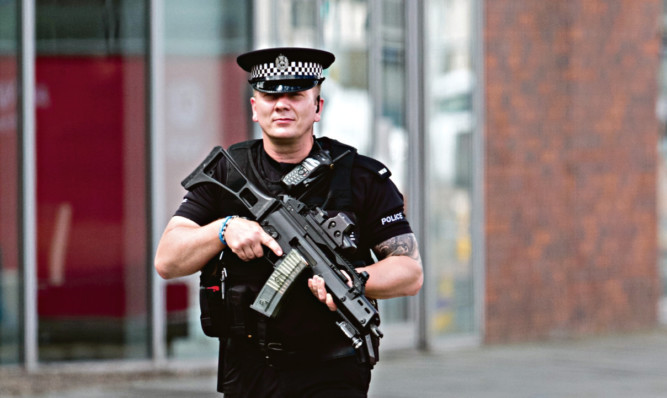
“It was a bad idea then … it’s a bad idea now.”
The campaigning dad of a Dunblane victim has slammed the routine arming of officers, the Sunday Post can reveal.
Dr Mick North whose five-year-old daughter Sophie was killed by evil killer Thomas Hamilton is highly critical of the back-door arming of police.
And he has hit out at Police Scotland’s Chief Constable Sir Stephen House for citing the tragedy as one of they key reasons he’s routinely sending armed officers out on to the streets.
The Chief Constable has armed almost 300 officers with Glock 17 semi-automatic pistols, citing Dunblane as a key example of how nowhere in Scotland is immune to violence.
The police chief on £208,000-a-year has also argued that providing on-the-beat cops with guns would reduce the time it took for armed response to arrive at major incidents. But Dr North believes the policy would not have halted the 1996 mass murder that claimed the life of his daughter and classmates and has labelled the step deeply concerning.
In addition to labelling the step “retrograde”, Dr North has also questioned what difference gun-toting police would have made to an incident that was over more than 10 minutes before officers arrived.
He’s now calling for a re-think on the controversial policy.
Dr North said: “I can’t see how any armed police would have stopped Dunblane not at all. We know that it took 15 minutes until any police officer arrived at the school when the incident was all over in three minutes. I can’t help but disagree with his decision.”
The former Stirling University lecturer lost Sophie, his only child, when Thomas Hamilton went on his murderous rampage at Dunblane Primary School on March 13, 1996. Sophie described by her dad as “bright and beautiful” was killed alongside 14 of her primary one classmates in a three-minute rampage inside the school’s gymnasium. Class teacher Gwen Mayor was also shot dead, before Hamilton finally turned the gun on himself.
At a meeting of Police Scotland and the Scottish Police Association on June 25, Sir Stephen was forced to defend his decision to secretly arm officers across Scotland. He illustrated both Dunblane and the 2010 Cumbria shootings as examples as why officers shouldn’t have to spend “an extra 5,10,15, 20 minutes” arming themselves, and should already be equipped with a firearm.
But Dr North who took early retirement a year after Sophie’s death is adamant that neither atrocity would have been prevented by having gun-weilding cops readily available.
He said: “For Sir Stephen House to cite Dunblane as a cause behind the routine arming of police is wrong. It was all over in three minutes before any police officer was anywhere near the school. If there is a case for doing what he has done, he needs to cite other examples where armed officers definitely would have prevented an incident. Dunblane is just not relevant.”
Within days of his daughter’s death, Dr North, now 66, was already campaigning for guns to be outlawed nationwide. He became one of the key voices behind the successful Snowdrop Campaign, which led to a ban on the ownership and sale of most handguns across the UK.
“Being successful in our campaign to ban handguns gave all the families involved great relief and comfort,” Dr North added. “Gun crime has and continues to fall considerably why try to escalate things by arming the police, as surely the response of criminals will be to up the weapons that they have too?
“It’s obviously important to have police officers who are trained to use firearms to deploy them in exceptional circumstances, but I do not see the need for routine arming. It concerns me it’s a retrograde step.”
Scottish Liberal Democrat Justice Spokesperson, Alison McInnes MSP shared that view. She said: “Communities across Scotland are concerned by the heavy handed tactics of Police Scotland which don’t fit with the local policing needs.
“We believe that armed officers should remain the exception, not become the norm. To use the tragedy of Dunblane to try to justify this central change in policing is wholly misjudged.”
Police Scotland’s stance is that no one has a crystal ball and that crime can happen anywhere.
Assistant Chief Constable Bernard Higgins, of Police Scotland, said: “We need to have the capability to respond to situations which arise that need a specialist response. Those situations can and do occur in cities, towns and rural communities.”

Enjoy the convenience of having The Sunday Post delivered as a digital ePaper straight to your smartphone, tablet or computer.
Subscribe for only £5.49 a month and enjoy all the benefits of the printed paper as a digital replica.
Subscribe